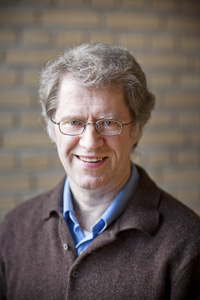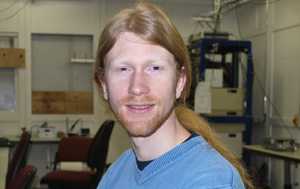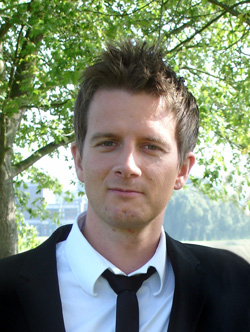By Gitte Bindzus Knudsen
and Kristian Serge Skov-Larsen
gbk@adm.au.dk / ksl@adm.au.dk
Bent Jesper Christensen, professor,
School of Economics and Management
Gorm Bruun Andresen, PhD scholar,
Department of Physics and Astronomy
Kristian Andersen, post-doc scholar,
Harvard University and MIT, USA
Did his PhD at Cornell University, USA (86-89), and has since taught there (93-94). Taught at New York University (89-95), and has recently been a visiting researcher at Harvard University (06-07).
 “Wherever I’ve worked in the USA, there have been far more foreigners than Americans. Employing people from other countries is absolutely normal,” says professor Bent Jesper Christensen, who also remembers that when he registered as a PhD scholar roughly 90% of the scholars were from countries other than the USA.
“Wherever I’ve worked in the USA, there have been far more foreigners than Americans. Employing people from other countries is absolutely normal,” says professor Bent Jesper Christensen, who also remembers that when he registered as a PhD scholar roughly 90% of the scholars were from countries other than the USA.
The Danish professor has just been in the USA for a year as a visiting researcher at Harvard University, but international staff are not helped very much at Harvard.
“At Harvard they’re used to people from other countries, but that doesn’t mean that they have a big department to help the foreigners. We got no help at all – but we didn’t actually need any. I already knew a lot about the States, and it was easy to find the information you needed without asking for help,” he explains.
His wife and three children aged 4, 9 and 12 went with him to Harvard. His wife is a researcher too, and found a job in the same area. But they had to find a childcare facility and a school for their children.
“I contacted some of the visiting researchers who had worked in the same job before me. Among other things, they told me where the best school was, and where it was best to live. Then we simply contacted the school and rental agencies in the area.”
Bent Jesper Christensen can imagine that working everything out must be difficult if you don’t know anyone who can help. But on the other hand he is not certain that universities can provide exactly the kind of help that people need.
“The researcher I contacted in France told me exactly which school was best, and we trusted him. If we’d asked the university they might have felt that recommending any one school would amount to favouritism. So for us things have turned out fine without any help from universities.”
Currently doing his PhD at CERN in Geneva, Switzerland.
 At first Gorm Bruun Andresen moved to Switzerland on his own in the late summer of 2006; but he was joined in March 2007 by his girlfriend – who is now his wife.
At first Gorm Bruun Andresen moved to Switzerland on his own in the late summer of 2006; but he was joined in March 2007 by his girlfriend – who is now his wife.
“I came down here alone at first to find a flat for us. This is really difficult in Geneva, and I actually went flat-hunting every day for three months,” explains Gorm Bruun Andresen, who managed to find a flat for the couple in the end.
Since then the little family has grown following the birth of their son Karl, now aged 15 months.
“At first my wife Karen was rather lonely, but ever since we had Karl she has had a better social life than I have. There are plenty of couples in the same situation as us – one working, and the other looking after the home. And then there are the children,” explains the researcher with a smile, adding that he is occasionally allowed to join in on events attended by his wife’s friends.
One of the problems in Switzerland is childcare. The waiting lists are long, childcare facilities are few and far between, and they are very expensive even if you can find a place.
“I like working here, but I’m not sure we’ll be staying on. It’s very difficult to have a decent family life. Children start at preschool at the age of three, which is absolutely fine by me. But they are there from nine in the morning until midday, after which they have to come home for two hours and then return to school from 2 to 5 pm. So you have to look after them for two hours in the middle of the day – or pay someone else to look after them. And if you send them to a childcare facility they stay there all day and you hardly ever see them. The Swiss system certainly doesn’t suit the Danish mentality in this respect,” he says.
Gorm Bruun Andresen is currently working on his PhD in Switzerland, but when he finishes it will be up to his wife to decide whether they should return to Denmark or try another country instead.
Did part of his Bachelor’s degree in biology from Aarhus (00-04) at the University of Kent (02-03); did his Master’s degree and PhD in the UK as well (Cambridge University (04-08)); and is now a postdoctoral fellow associated with Harvard University and the Massachusetts Institute of Technology (MIT) in the USA.
 At the moment the welcome extended to Kristian Andersen in his new home (the USA) is somewhat less than warm.
At the moment the welcome extended to Kristian Andersen in his new home (the USA) is somewhat less than warm.
After a field trip to Africa collecting samples of infectious diseases such as Lassa fever for his research into mutations in aggressive viruses, he has only just been ‘released’ from a period of quarantine at the local hospital in Massachusetts.
But otherwise he is very impressed by the welcome extended by both British and American universities to researchers from other countries. By the time he arrived in Cambridge the university had already arranged accommodation, and the university also helped him with a telephone problem and the opening of a bank account. There was also an introductory meeting at which people were given answers to any questions.
“You really feel very welcome when there’s a package with your name on it waiting for you on the day you arrive. This kind of thing helps you to get started on your research straightaway, which is a great advantage from the university’s point of view,” he explains.
In Kristian Andersen’s own words the move to the USA has been a bit messier – and the American healthcare system has been particularly difficult to handle. But here too, Harvard and MIT in particular have lent him a helping hand.
“When you arrive at the university you talk to a member of the administrative staff who can answer any questions you might have and help to solve any problems. There have also been a number of follow-up meetings at the university to deal with tax questions and other issues since then.”
Kristian Andersen’s Finnish wife is with him in the USA, and Harvard has paid for her health insurance and helped her to apply for a work permit. And according to Kristian Andersen, it is absolutely vital to help the families of international researchers as well.
“We both need to feel at home here, and even though I’ve got a fantastic job I know who would lose out if I was forced to choose between Harvard and my wife. Harvard would lose out,” he says with a smile.